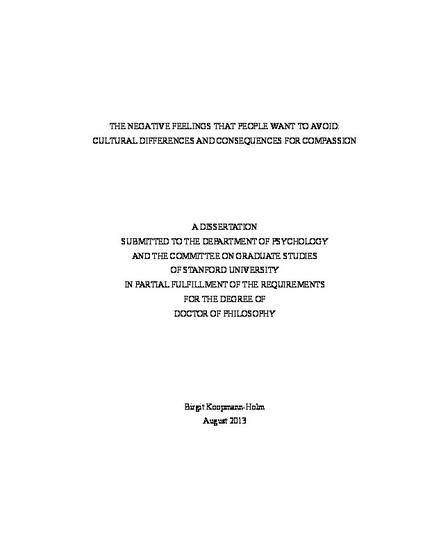
Previous research has documented cultural differences in the positive states that people desire. Less research, however, has examined whether cultural differences exist in the negative states that people want to avoid feeling ("avoided negative affect"). Using a multimethod approach, we examined cultural differences between Americans and Germans in avoided negative affect and whether they are related to different responses to suffering, or compassion. In Study 1, using survey methods, we assessed whether avoided negative affect differs from related constructs, and based on an existing literature, tested our hypothesis that Americans want to avoid negative affect more than do Germans. As predicted, avoided negative affect is distinct from actual negative affect (the negative states people actually feel) and from ideal negative affect (the negative states people ideally want to feel) and European Americans wanted to avoid negative states more than did Germans. In Study 2, we compared the emotional content of American and German sympathy cards to examine cultural differences in responses to suffering. As predicted, American cards contained more positive and less negative content than did German cards. In Study 3, using survey methods, we examined whether cultural differences in responses to suffering were due to cultural differences in avoided negative affect. As predicted, Americans felt less comfortable sending sympathy cards that contained primarily negative content (e.g., "words will not lighten a heavy heart") than did Germans, and these differences were mediated by cultural differences in avoided negative affect. Finally, in a series of experiments, American and German participants were randomly assigned to either "avoid negative affect" or "approach negative affect" conditions. Overall, participants in the "avoid negative affect" conditions preferred sympathy cards with negative content less than those in the "approach negative affect" conditions. These findings suggest that differences in avoided negative affect at least partially drive different responses to suffering (i.e., compassion).

© Copyright 2013 by Birgit Maren Koopmann-Holm. This work is licensed under a Creative Commons Attribution-Noncommercial 3.0 Unported License
A dissertation submitted to the department of psychology and the committee on graduate studies of Stanford University in partial fulfillment of the requirements for the degree of Doctor of Philosophy.